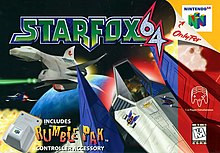| Star Fox 64 | |
|---|---|
 North American box art | |
| Developer(s) | Nintendo EAD |
| Publisher(s) | Nintendo |
| Director(s) | Takao Shimizu |
| Producer(s) | Shigeru Miyamoto |
| Designer(s) | Shigeru Miyamoto[1] |
| Programmer(s) | Kazuaki Morita |
| Artist(s) | Takaya Imamura |
| Writer(s) | Mitsuhiro Takano |
| Composer(s) | Koji Kondo Hajime Wakai |
| Series | Star Fox |
| Platform(s) | Nintendo 64, iQue Player |
| Release | iQue Player
|
| Genre(s) | Rail shooter, shoot 'em up |
| Mode(s) | Single-player, multiplayer |
Star Fox 64,[a] known as Lylat Wars in the PAL regions, is a 1997 rail shooter game developed and published by Nintendo for the Nintendo 64. It is the second installment in the Star Fox series and a reboot of the original Star Fox for the Super Nintendo Entertainment System.[2]
Star Fox 64 was the first Nintendo 64 game to feature support for the system's Rumble Pak peripheral, which initially came bundled with retail copies of the game. Since its release in 1997, the game has sold over 4 million copies, making it the best-selling game in the series and the ninth best-selling game on the system. The game received critical acclaim for its precise controls, voice acting, multiplayer modes, and replay value through the use of branching gameplay paths. Like the SNES Star Fox game before it, Star Fox 64 has been deemed one of the greatest video games of all time. A stereoscopic 3D remake for the Nintendo 3DS, Star Fox 64 3D, was released in 2011, and a reimagining for the Wii U, Star Fox Zero, was released in 2016. The game was also re-released on the Nintendo Switch Online + Expansion Pack at the launch of the service on October 25, 2021.
- ^ "Interview with Shigeru Miyamoto". Nintendo Power. January 1997. Archived from the original on 21 December 2008. Retrieved 2 December 2008.
- ^ Star Fox 64 Player's Guide. Nintendo. 1997. p. 116.
Did you use any ideas from that game in Star Fox 64? Why did you make Star Fox 64 a remake of the original Star Fox?
Cite error: There are <ref group=lower-alpha> tags or {{efn}} templates on this page, but the references will not show without a {{reflist|group=lower-alpha}} template or {{notelist}} template (see the help page).